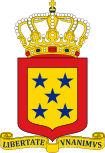 |
|---|
General elections were held in the Netherlands Antilles on 27 January 2006. The result was a highly fragmented Estates, with no party winning more than five seats.
 |
|---|
General elections were held in the Netherlands Antilles on 27 January 2006. The result was a highly fragmented Estates, with no party winning more than five seats.